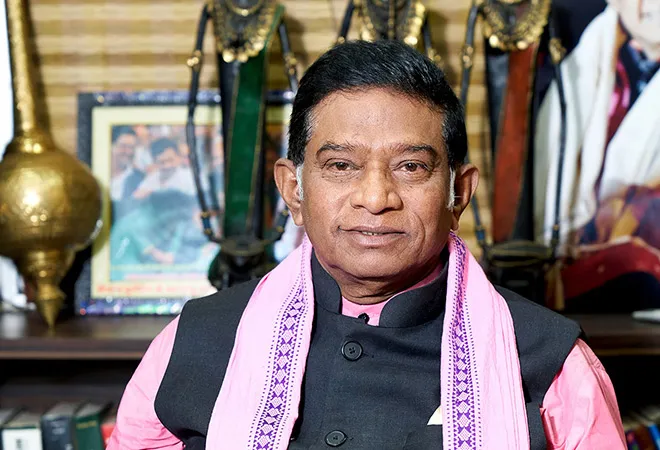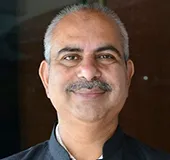
With the first round of polling in Chhattisgarh today, Ajit Jogi, the former State Chief Minister who has tied up with the BSP, wants to be a V. Kumaraswamy (Karnataka Chief Minister) in Raipur. However, unlike the Karnataka Janata Dal (S) chief minister, Jogi (of Janata Congress) is open to the idea of getting support from either the Congress or the BJP.
Going by the poll campaign build-up and history of the newly carved out tribal State of Chhattisgarh, chances of a hung house and a third front getting substantial number of assembly seats in the house of 90 are little. But, then, Jogi has been a man who has emerged big from virtually nothing. 1n 1986, he was one among the 45 district collectors of Madhya Pradesh. His tenure as collector of Indore somehow caught Prime Minister Rajiv Gandhi’s attention. Jogi resigned from the Indian Administrative Service to enter the Rajya Sabha. This was a time when Rajiv Gandhi was facing hostile opposition despite having mammoth majority in the parliament. Jogi, like Surendra Singh Ahluwalia, Suresh Pachauri, RatnakarPandey, Baba Mishra and the rest, became a member of Rajiv Gandhi’s (in)famous 'shouting brigade' with a Bull Terrier-like rage against V.P. Singh & Co. Prior to getting into the Rajya Sabha, the young Satnami man had cleared the Indian Police Service (IPS) and Indian Administrative Service (IAS) in style as he got through in the general category instead of the reservation route meant for SC-ST categories.
Destiny had smiled at him in November 2000, when the NDA Prime Minister Atal Bihari Vajpayee decided to create three new States of Jharkhand, Uttrakhand and Chhattisgarh. Jogi did not have the support of even half a dozen Congress MLAs in Chhattisgarh, but he positioned himself as tribal Chief Minister of the State even though a case pertaining to caste status (the row over Jogi's caste status dates back to three decades challenging Jogi's claim to be a tribal) was in courts. Sonia Gandhi acted a bit naïve. Her antipathy towards aspirant Vidya Charan Shukla was grounded on Shukla betraying Indira Gandhi after her 1977 defeat and raised the bogey of Bofors’ during P V Narasimha Rao era when Shukla was parliamentary affairs minister. Little had she realised that years later, Jogi would play a Shukla on her. Jogi was chosen as the leader of the Congress legislature party in spite of not enjoying much support. It was alleged that many religious heads belonging to Christian faith had lobbied for him, a charge that was stoutly denied by Sonia Gandhi as well as the Congress party then.
Jogi’s anointment as Chief Minister of Chhattisgarh was eventful in Raipur on the night of November 1, 2000. AICC general secretaries Prabha Rau and Ghulam Nabi Azad, who were central party observers, wanted to watch the film Mission Kashmir to while away some time in Raipur. Instead, they were treated to impromptu fistfight between supporters of Shukla and Digvijaya Singh. The Chief Minister of undivided Madhya Pradesh was on ground receiving kicks and punches barely hours before the vast tracks of fertile land and mines were to slip out of his kingdom. At the time of swearing in, capital Raipur bore eerie silence and a general hartal, as if mourning over local Shukla’s failure to get his due.
Jogi’s three-year term as Chief Minister was equally eventful. As if Sonia Gandhi had shut her eyes and ears to entertain any complaint against Jogi, the Chief Minister was given a free hand. A son rose in Sanjay Gandhi manner, calling shots and emerging as an extra-constitutional authority. By the time the November 2003 State assembly polls were called, a supremely confident Jogi was busy plotting against his own party nominees so that he would get a bare working majority and deprive the ‘high command’ (Sonia) any chance to replace him with another Chief Minister. The final outcome had a different story, but Jogi was unrelenting. He reportedly informed the State Governor that a faction of newly elected MLAs were prepared to switch sides. The Governor, a former army lieutenant general, schooled in propriety and ethics, informally alerted 10, Janpath and Jogi was given a stern word to accept the mandate. The behind-the-scene swift action prevented a major showdown between the otherwise genial Prime Minister Vajpayee and Sonia Gandhi.
Like November 1, 2000, on December 11, 2018, Jogi may not have support of many MLAs but if poll verdict throws up a hung house, he would try his luck, rather hard. Purely as coincidental, Jogi’s politician wife Dr Renu Jogi claims to be in the Congress. Jogi this week went public declaring that during the campaign, he would not speak against Sonia or Rahul Gandhi.
However, the chances of Jogi being lucky in December 2019 are slim. A majority of influential Congressmen do not like Jogi. According to them, Jogi has had the privilege of being schooled by several powerful and wise men, but the bureaucrat-turned-politician did not learn much from them. The somewhat legendary patience and dexterity of Pranab Mukherjee, Arjun Singh, P.V. Narasimha Rao, P. Shiv Shankar and Ahmad Patel failed to rub on Jogi, who spent countless hours with them in attendance, often as audience or just as a hanger-on.
Coming from a modest background with a sharp mind, Jogi has always been in hurry and at breakneck speed to beat his contemporaries and prove himself the brightest. The hunger to prove himself had numerous hours of glory when Rajiv Gandhi's assassination in May 1991 saw many loyalists losing out in the political labyrinth that saw a stoic Sonia Gandhi, a maverick Narasimha Rao consolidating his hold over the Congress organisation and office of the Prime Minister, a trio of Arjun Singh, Makhan Lal Fotedar and Vincent George plotting against Rao and a large number of confused chief ministers of the Congress-ruled states, CWC members etc.
The period between 1993 and 1996 saw Jogi at his best. His day would begin with paying visits to Vincent George, Arjun Singh and a galaxy of other leaders and end at the court of pipe-smoking Pranab Mukherjee, whose contempt towards Arjun Singh and partiality towards Narasimha Rao were always visible. The former bureaucrat desisted from carrying tales or throwing his lot with any particular faction of the Congress. So, when his friends Aslam Sher Khan, Dileep Singh Bhuria, Rangarajan Kumaramangalam and others sat on a dharna at the Surajkund AICC, Jogi saved himself from the humiliation of getting roughed up by Haryana cops. It so happened that when 'Gandhian' Sher Khan, Bhuria and the rest tried to march towards the podium where Rao was sitting, some Sewa Dal volunteers intercepted them. Congress folklore has it that those were Haryana policemen masquerading as Congress Sewa Dal volunteers. Without a lathi or fraternal affection, they squeezed unmentionable body parts as per their drill to tame the marchers.
Finally, when Arjun Singh resigned and floated a breakaway Tiwari Congress with N.D. Tiwari in May 1995, Jogi was missing from the ranks. By 1995, Jogi had struck friendship with Bhuvnesh Chaturvedi, a low-key minister in Rao’s PMO. Unlike Ahluwalia and AslamSher Khan, Jogi could not become a junior minister in Rao government, but he became a frequent visitor to 7, Race Course Road, hearing out an otherwise reticent Narasimha Rao.
The 1996 defeat of the Congress saw Jogi changing gears swiftly. He was in the company of Priyaranjan Dasmunshi, Prithviraj Chavan and others giving a marching order to Rao as leader of the Congress Party in the parliament. Jogi was a regular fixture at the newly appointed AICC chief Sitaram Kesri who disliked both Arjun Singh and Digvijaya Singh. For Kesri, there were only three types of Congressmen – forward, backward and ‘Har’-vard (those foreign educated politicians who pushed Congress towards ‘har’, i.e. defeat, Kesri used to say in oblique ref to P Chidambaram, Mani Shankar Aiyar, Salman Khurshid and others ). This was also a golden period of sorts for Jogi as he succeeded in creating a deep wedge between Kesri and Madhya Pradesh Chief Minister Digvijaya Singh. However, before Kesri could orchestrate Digvijaya’s ouster and his replacement with Subhash Yadav, he was himself evicted as AICC chief. Jogi wasted no time in doing a 180 degree turn towards V. George, M.L. Fotedar and the rest.
Tragedy struck when Jogi’s speeding car rammed into a tree in April 2004. Months and years of hospitalisation did not affect Jogi’s determination to stay relevant. Sonia’s own sense of disillusionment over some unsavoury incidents and Rahul’s indifference peeled the mask of loyalty and Jogi moved to Raipur, threatening to teach the Congress a lesson. However, in so doing, his family has maintained ties with the Congress and with the BSP, and an informal line with the Raman Singh-led BJP regime in Chhattisgarh.
A latest incidence gives a glimpse of the life and times of Ajit Jogi. A few months ago, Jogi had announced in bravado that he would take on Chief Minister Raman Singh from Rajnandgaon. Closer to filing nomination, Jogi changed track, declaring that he would not be contesting assembly polls. However, before the statement could sink it, a busload of loyalists arrived from Marwahi. They pleaded and begged with Jogi, under the watchful eyes of TV news cameras, to file his papers from Marwahi and let them campaign for him. A somewhat helpless Jogi was seen accepting the 'will of the people' as per the democratic norms. The audacity to take on Chief Minister Raman Singh vanished in thin air.
Jogi’s chances against Congress are based on a scenario that Chhattisgarh verdict will throw a hung house. Jogi would back the BJP if it falls short of few seats. With the Congress, he would do tough bargain, including a claim on Chief Minister's post if his alliance with the BSP and CPI gets 10 assembly seats. If either the Congress or BJP gets a clear majority, Jogi factor would end in state politics. His idea of a tie-up with BSP is to get into a 'king-maker' position and queer the pitch for the Congress. Mayawati too wants a weak Congress for 2019 Lok Sabha polls. The concept of Mahagathbandan is a mirage as non NDA parties like BSP, Trinamul do not want Rahul-led Congress to win Chhattisgarh, Madhya Pradesh and Rajasthan.
Jogi has a hold over Satnami Harijans who matter in 4-5 assembly seats. With BSP and CPI, Jogi is fancying 10 seats which is unlikely. Chhattisgarh or its parent State Madhya Pradesh has no history of coalition politics. In 2013, the Congress vote percentage was barely 07 per cent, less than the BJP in spite of a tottering UPA regime and the emergence of Narendra Modi as a harbinger of hope.
The views expressed above belong to the author(s). ORF research and analyses now available on Telegram! Click here to access our curated content — blogs, longforms and interviews.




 PREV
PREV


